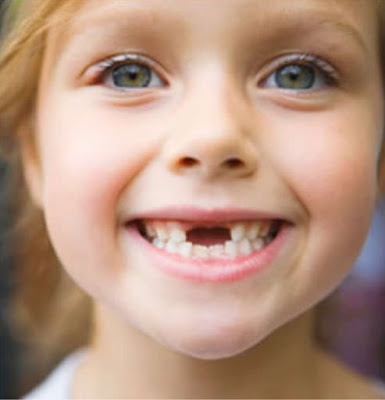EASING CHILD ANXIETY ABOUT LOSING TEETH
Losing
a first tooth is a big deal for a child but shouldn’t be a scary milestone. For
some, this was a pretty stressful time, while others found ways to speed up the
process so they could get those Tooth Fairy payouts faster. So you should make
this childhood milestone go as smoothly and stress-free.
No
matter what, though, the prospect of losing that first tooth is new territory
for every child, and it can seem very strange and frightening to them. On the
other hand, if your little one has just lost her first baby tooth, she might be
freaking out. She’s had that tooth for most of her tiny, little life but now
it’s gone (and blood may have been involved!). Losing the first tooth is a big
deal for a child but shouldn’t be a scary milestone. That’s why we’re here to
help you calm your child’s nerves as they approach this milestone.
So
how can you make this childhood milestone go as smoothly as possible?
Make it a ceremony
One
of the top priorities of young children is proving to everyone around them that
they’re “one of the big kids.” They’re growing taller, they can tie their own
shoelaces and they’re learning new things every day at school. Few things
symbolize maturity better to kindergarteners and first graders than a
gap-toothed smile.
A
great way to help your child look forward to losing that first wiggly tooth,
then, is to help them focus on what an important ceremony it is and how
grown-up they’ll feel after the tooth comes out.
Dos and Don’ts for Parents with Wiggly Teeth
Even
when your child has the right attitude and is excited to gain Big Kid status by
losing a tooth, it can still seem scary. Perhaps another child or an obnoxious
uncle has filled their imagination with horror stories about the pain of losing teeth. You can ease their fears and make the experience more positive by
following a few tips:
·
Don’t use pliers or
other scary tools, especially if the tooth is barely loose.
·
Encourage your
child to gently wiggle the loose tooth on their own with a clean
finger, their tongue, or a tissue.
·
Wait for
your child to ask for your help pulling the tooth instead of forcing the issue.
Don’t Forget to Give Incentive
There
are many ways parents can reward their children for successfully losing their
first tooth. The Tooth Fairy is a particularly popular one, with different
versions of the tradition practiced all across the world.
Remember
to Celebrate with hugs, kisses, joy, and take lots of pictures. Reward your
children with tasty treats like ice cream or a new toy befitting a child who
just became a big boy or girl.
Wish you and your child the best of luck!



Comments